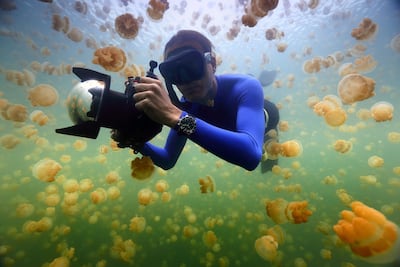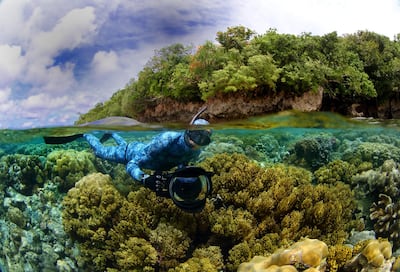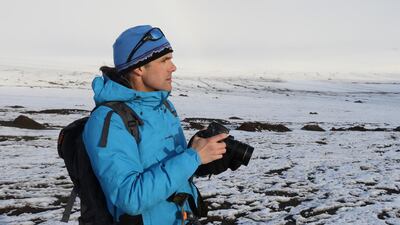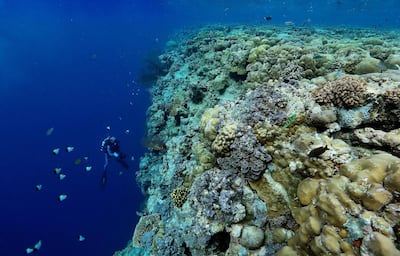Enric Sala is as charismatic and passionate as you would expect a man to be whose business card reads ‘Explorer-In-Residence, National Geographic Society’.
He also cuts a dashing and capable figure, as befits a job that has taken him on marine research trips around the world’s shark-filled waters and frozen seas.
While he is telling me about his conservation work and dedication to the protection of nature, his voice never needs to rise to a shout for him to be heard above the din of a coffee break at the World Economic Forum’s Global Future Councils meeting in Dubai, where we met in November. This air of calmness gives him even more credibility, a key factor in persuading anyone about the importance of action on green issues in today’s atmosphere of heightened hysteria over the arguments about the risks of climate change.
Growing up on the Mediterranean coast of Spain, Sala began to observe nature early on and was inspired as a child by the example of Frenchman Jacques Cousteau. Like his hero, he became an ocean explorer, marine scientist and a diver. He worked as a university professor after obtaining his PhD in ecology and settled into a life as a highly respected – if somewhat adventurous – academic at the Scripps Institution of Oceanography, a part of the University of California, San Diego. He was often in the field, carrying out research in in the Gulf of California, the Mediterranean Sea and Belize. His academic work has informed and helped marine conservation efforts around the world. As he grew older though, it wasn’t enough to just study nature, he felt a calling to do more.
It was the tragedy of seeing, with his own eyes, the decline of life in the ocean, that moved him to make a change and quit a life in academia for a more activist role in conservation.
“Places that I love so much are now dead, the big fish are gone, the coral reefs are gone. All I was doing as a scientist was writing the obituary of the ocean. I felt like the doctor telling the patient she is going to die in excruciating detail but offering no cure. I am dedicating the rest of my life to conservation, to try to save as much life on the planet as possible.”
After taking on the role as Explorer-in-Residence in 2011, Sala founded National Geographic’s Pristine Seas project which combines exploration, research, and media outreach to inspire nations to protect the wild parts of the oceans. As of last year, Pristine Seas has helped to create 13 of the world’s largest marine reserves, covering an area of over 4.5 million square kilometres.
“In terms of biodiversity we are worse than we were 25 years ago. We cannot cut down one single more tree if we are to avert catastrophic climate change,” he warns.
Biodiversity is a term that, simply put, means all life on earth, in all of its forms, and the importance of not allowing the variety of it to diminish - across food chains, including plant life, insects and bacteria. The more species there are, the more powerful nature's contribution to a sustainable existence for all of us. Loss of biodiversity contributes to dangers such as global climate change through reduced absorption of carbon emissions. It undermines food security and raises the risks from storms and flooding.
“By 2020, the countries of the world agreed that 17 per cent of the land and 10 per cent of the oceans should be protected. We will get there but it is not enough. Scientific studies show us that nature is our greatest ally, if we want nature to help us continue providing the conditions to make this planet inhabitable, if we want nature to help us avert catastrophic climate change, we need to keep half of the planet in a natural state,” Sala says.
The latest data show that 15 per cent of the world’s land and 7 per cent of its oceans are now designated as protected areas.
“The abundance of large fish in the ocean has declined by 90 per cent because we have killed them. Since 1970, 60 per cent of the wildlife on the land has disappeared. We are losing insects, we are losing forests, we are not making progress.”
According to Sala, a severe problem is the way we produce food.
“One of the main reasons that developing countries are not developing well enough is because the rich countries are consuming their resources. Huge areas of forest that have been cut, or grasslands that have been converted in developing countries so that rich countries can eat cheap burgers – that is a real problem. Right now in the world, about half of the inhabited land is dedicated to agriculture and half of that is dedicated to feed cows through grazing or [growing] feed for cows. In the United States alone, 40 per cent of the land is dedicated to cows,” he says.
Cows are one of the biggest causes of emissions and deforestation. Without forests, that part of the planet cannot absorb enough of the carbon dioxide we throw into the atmosphere. Also, cows produce an enormous amount of methane, which is a powerful greenhouse gas.
“So the way we produce food is really damaging to the climate and also is not efficient, it is very wasteful. We are losing soil; millions of tonnes of soil are lost every year just in the United States. We are using fertilisers and pesticides. This is not progress. This is not helping developing countries,” Sala says.
There are three key actions that can be taken to help the situation, according to the conservationist, which includes changing the way food is produced.
“So we need to shift to regenerative agriculture…where the plants help to produce soil and which absorb a huge amount of carbon. And [ultimately] it’s more nutritious food. We can feed 10 billion people today with the food we produce because a third of the food we produce is wasted,” he says.
The other two actions include working to achieve carbon neutrality by 2050, which requires a shift to a greater use of renewable energy. Thirdly, he says that we need to give more space to nature.
Half of the planet must be designated as protected areas or kept in a natural state so that it can keep providing for us.
This is a hugely ambitious ask. However, the way many nations came together for the Paris accord on Climate Change in 2015 shows a possible path forward to achieving it, he says.
“We are facing a true planetary crisis and we need all hands on deck. We need governments to agree to very ambitious targets for the conservation of nature by 2020 and then we need them to implement these targets. We need businesses, in the same way they came together for climate change, to understand and come out and say that biodiversity and nature is essential to the bottom line,” Sala says.
Everybody can help, not just businesses and governments.
“We need the public. We need people to come out and demand their leaders show more ambition for conservation of nature in the same way that millions of people came out in the streets in September 2015, two months before the Paris climate meeting,” he says.
People can also make day to day changes to their lifestyles that can help combat the loss of biodiversity.
“Eat more vegetables and fruit. If there is one thing that the average citizen can do, eat more plants and less meat because meat is one of the worst contributors to climate change. It is as simple as that. If everyone cut their meat consumption and ate more plants, they would be healthier and happier and I am one example [of that].”

Sala is not a vegan or vegetarian per se but he only eats meat occasionally, when he feels his body needs the iron in a steak, for example. He does feel strongly that modern society’s obsession with eating meat is a huge problem.
“Livestock is one of the most stupid things we are doing to our planet and to ourselves,” he says.
“If you get all of the mammals of the planet – animals like whales, antelopes, lions, humans and cows – and weigh them together, 60 per cent of that weight, of that biomass, is livestock like cows and 36 per cent is humans and only 4 per cent of the mammal biomass of the world is wildlife. Of birds, 70 per cent of total biomass is poultry and only 30 per cent is wild birds. People have no idea of how we have transformed our planet and the scale. We are transforming our planet at the geological scale.”
His impassioned plea does not mean that he thinks consumers should feel guilty. In his experience, guilt doesn’t work as an effective motivator for change.
“People shouldn’t feel the need to be responsible, governments and industry have a huge role to play. The most egregious impacts on the planet are done by large corporations, with the help of governments. It is greed and corruption and short-term-ism. In countries where there is good leadership and a long-term vision, things are much better. In Bhutan, they have a gross happiness index and in the constitution it says at least 60 per cent of the land has to be in forest.”

The Middle East lags behind other areas in the world with regards to setting up protected areas. The UAE has made strides, however, with Al Wathba Wetland Reserve in Abu Dhabi now on a global list of protected areas, for example.
“I wish Arab countries led on conservation and nature but unfortunately there are so many human-created problems [in the Middle East] that are a short-term priority,” he says.
However, efforts in the region, such as in the Emirates and Saudi Arabia, to develop renewable energy sources such as solar power are an important part of the global push towards supporting biodiversity, he says.
More recently in the region, access to clean water has become a politically charged issue with protests in Basra over contamination of its supply. This is as much a biodiversity issue as anything else, Sala says.
“[There have been] huge problems with everything that has happened with the Tigris and Euphrates, all the deforestation in the mountains plus the transformation of the wetlands, [and also] using water for irrigation for thousands of years. Of course we have a water problem and climate change exacerbates the problem.”
Nature intact, can act as a natural, cost effective water filter, he says. More broadly, however, as long as we continue using more resources than the earth can produce we will have a problem. We must try to consume less of everything.
There is some positivity though around technology and its role in supporting biodiversity.
Digital tools allow conservationists to monitor the earth in real time to see, for example, where the forest is being cut down, where there are human created fires, or illegal fishing and poaching around the world.
“For monitoring and enforcing the law and international agreements, the technology today and the Big Data are amazing tools because we can act in almost real-time, something we couldn’t have thought about ten years ago,” he says.
____________________
Read more:
By creating an inclusive and equitable future, we can reclaim the
Abu Dhabi to study climate change threat facing sea creatures
Flamingo flights tracked for UAE conservation celebration
___________________



